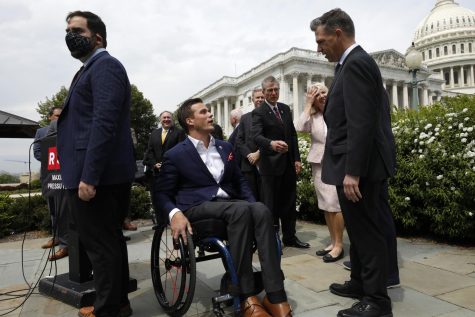Trump warns that a ‘civil war’ will start should his impeachment be successful
The White House fenced-off in Washington, D.C. on May 27, 2017
President Donald Trump is attempting to deter his Democratic opponents from continuing with impeachment procedures by warning them of a civil war in the event that he loses.
Trump took to Twitter on Monday, Sept. 29, responding with a comment originally authored Sunday, Sept. 28, by longtime Trump supporter Robert Jeffress, a Fox News contributor and Evangelical pastor. The comment was revised slightly.
“I have never seen the Evangelical Christians more angry over any issue than this attempt to illegitimately remove this President from office, overturn the 2016 (…) Election, and negate the votes of millions of Evangelicals in the process,” Trump wrote. “If the Democrats are successful in removing the President from office (which they will never be), it will cause a Civil War like fracture in this Nation from which our Country will never heal.”
The statement was made in response to Nancy Pelosi’s Sept. 24 announcement of an impeachment inquiry against the president. She is the Speaker of the House, over which the Democrats gained control in the 2018 midterm elections. The inquiry comes after Trump solicited Ukranian President Volodymyr Zelensky on July 25 to investigate the business dealings of former Democratic Vice President Joe Biden’s son Hunter. An anonymous whistleblower filed a complaint on Aug. 12.
Trump explained that his phone call intended to help deliver more money to Ukraine. He falsely complained that the United States was the only country sending aid to the country, which has been ravaged by conflict with American rival Russia since 2014. Germany, France and other European nations have also contributed millions for Ukraine.
The main purpose of his call, however, was to ask Ukraine to interfere in the 2020 presidential election in Trump’s favor.
“The Do Nothing Democrats should be focused on building up our Country, not wasting everyone’s time and energy on BULLSHIT, which is what they have been doing ever since I got overwhelmingly elected in 2016, 223-306. Get a better candidate this time, you’ll need it!” Trump tweeted on Wednesday, Oct. 2.
The House has released many subpoenas against the White House for Ukraine-related documents as of Wednesday. Secretary of State Mike Pompeo was even hit with one such order last weekend. The documents in question will serve as evidence of obstruction of justice should they not be turned over.
“We’re not fooling around here,” Schiff, a high-ranking House Democrat, has warned. “We don’t want this to drag on months and months and months, which appears to be the administration’s strategy. They will be strengthening our case on obstruction if they behave that way.”
Trump slammed the complaint, calling it “another witch hunt” last Monday and “very inaccurate” that Wednesday. He has also demanded the identity of the whistleblower, instilling fears in the whistleblower’s lawyers for their client’s safety. This fear is also resonating among a handful of Republicans, including Iowa Sen. Chuck Grassley. When reporters told Trump this, he replied, “I don’t care.”
No formal articles have been introduced against Trump as of yet. Democrats, however, plan on doing so later this fall.
Impeachment does not automatically guarantee Trump’s formal removal from office. In civilian criminal law, it is equivalent to an indictment, or the formal accusation of a crime by a grand jury.
The impeachment process contains three procedures. Congress first completes a thorough investigation into the president’s alleged misconduct. Then, the House of Representatives must formally pass impeachment articles by means of a majority vote. The first two steps are likely to succeed because most House seats are occupied by Democrats.
The final step is a Senate trial, presided over by the Chief Justice of the United States, who is currently John Roberts. At least sixty-seven members are required to vote against the president in order for conviction to occur. If Trump is convicted, he is to be removed from office immediately and possibly face additional penalties, such as disqualification from all public offices for a set period of time.
This is a developing story, and facts contained herein may become outdated or incorrect.











